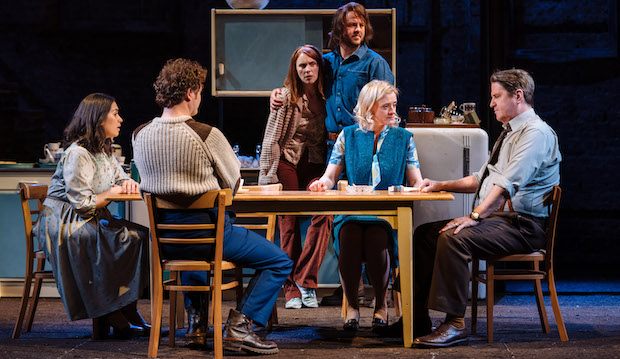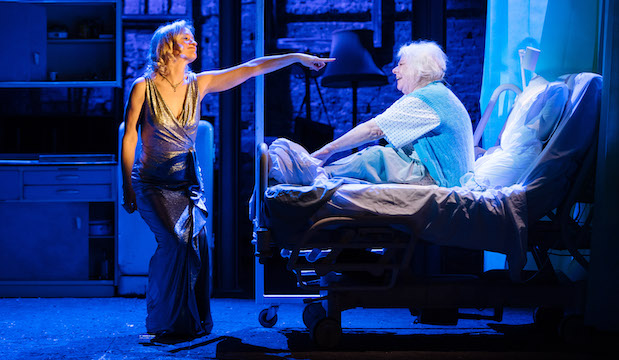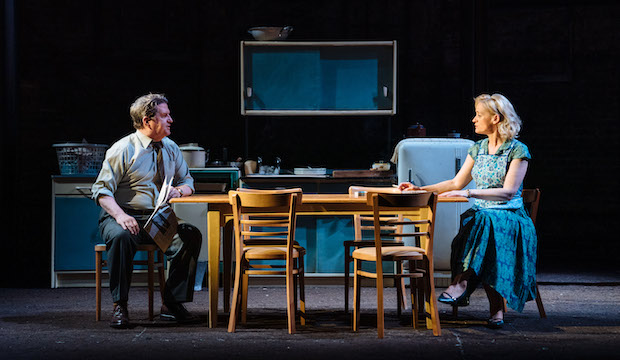House of Shades, Almeida Theatre review ★★★★★
Anne-Marie Duff stars in the world premiere of Beth Steel’s House of Shades, a family-cum-political saga observing six decades of working-class Britain
Anne-Marie Duff in The House of Shades. Photo: Helen Murray
The personal is political in House of Shades, playwright Beth Steel’s new family saga that follows the working-class household of the Websters for six decades, while mapping Britain’s shifting industrial landscape. It’s a pensive, intelligently vocalised state-of-the-nation drama, fortified by a central performance from the ever-mesmerising Anne-Marie Duff (Sweet Charity, Macbeth).
The play drops in on the Websters every decade or so between 1965 and 2019. In the early years, the kitchen is very much the nucleus of this seemingly tight-knit family, which touches four generations, and in which all names are prefaced with ‘our’ (‘our Laura’, ‘our Jack’) in a sign of affectionate kinship. Director Blanche McIntyre (Hymn) and designer Anna Fleischle (Hangmen) colour in this home with a functioning 60s kitchen, which in one scene proves itself capable of cooking a fry-up.

Left to right: Emily Lloyd-Saini, Michael Grady-Hall, Kelly Gough, Daniel Millar, Anne-Marie Duff and Stuart McQuarrie in The House of Shades. Photo: Helen Murray
Over the years, livelihoods are forged then lost, strikes unite the community and the local high street flourishes then fizzles out. Inside the home, young Websters grow from teens into adults, babies are born, political loyalties shift or stay staunchly the same – fracturing the family – and members of the unit pass away.
But this is not a wholly naturalistic kitchen-sink drama: overseeing the deaths is an omniscient narrator, responsible for laying out the town’s bodies and reminding us, in the thick of this family drama, of the fleeting impermanence of our time on earth. She’s seen it all: young, old, rich, poor, left-wing, right-wing – and knows that, in death, bodies are just shells that once housed beliefs, dreams, memories and secrets.
Steel also allows her characters to speak from beyond the grave, playing with the notion of a liminal period between life and death. The ghost of Welsh Labour politician Nye Bevan, who founded the NHS, appears to the family’s socialist patriarch Alistair (Stuart McQuarrie, doing justice to his character’s exhausted disenfranchisement) in his final moments, offering some horribly prescient observations about the Tories.

Anne-Marie Duff and Carol Macready in The House of Shades. Photo: Helen Murray
Through the years, one thing stays the same: the expectation for women to be primary caregivers, even when they have their own careers to think about.
Anne-Marie Duff’s Constance is broodingly bitter about this. She’s a downtrodden housewife who resents having given her best years to raising three children and fantasises about a more glamorous life in keeping with that of her Hollywood hero, Bette Davies. Duff is mesmerising to watch, commanding the stage so naturally and balancing her outward role as mother, wife and, later, dependant, with glimpses of her gnawing resentments and dreams.
Social mobility isn’t an option for her – in her early adult years, women bringing in an income is seen as a novelty – and if she were to leave her unhappy marriage, who would take her on? Her inner discontent manifests as outward cruelty, which in turn leads to her making a decision with terrible consequences and a dark secret that haunts the rest of her life.

Stuart McQuarrie and Anne-Marie Duff in The House of Shades. Photo: Helen Murray
McIntyre’s production handles the shifts in time with slick tenderness. As Michael Grady-Hall and Kelly Gough take over from their younger counterparts, Gus Barry and Issie Riley, as the Webster children Agnes and Jack, a caring look between them shuttles the characters into their new bodies.
House of Shades is as much a political drama as it is a family one, and while primarily one that reflects on the disastrous impact of Thatcher’s government on the working class, it voices the counter-argument through Jack, who benefits from a capitalist system that allows him to grow a business, climb the social ladder and make more money than he ever would have from a life down the pit. In one scene, Labour and Tory ideologies go head-to-head as grown-up Agnes and Jack become vessels for the arguments for and against a welfare state.
House of Shades reaches a few stumbling blocks towards the end, adding two final plot twists that detract from its political message. Even so, it voices the class and gender disparities our economy has thrived upon, and while the narrative culminates in 2019, this 50-year snapshot of British history should prove worthy of revivals in years to come.
The play drops in on the Websters every decade or so between 1965 and 2019. In the early years, the kitchen is very much the nucleus of this seemingly tight-knit family, which touches four generations, and in which all names are prefaced with ‘our’ (‘our Laura’, ‘our Jack’) in a sign of affectionate kinship. Director Blanche McIntyre (Hymn) and designer Anna Fleischle (Hangmen) colour in this home with a functioning 60s kitchen, which in one scene proves itself capable of cooking a fry-up.

Left to right: Emily Lloyd-Saini, Michael Grady-Hall, Kelly Gough, Daniel Millar, Anne-Marie Duff and Stuart McQuarrie in The House of Shades. Photo: Helen Murray
Over the years, livelihoods are forged then lost, strikes unite the community and the local high street flourishes then fizzles out. Inside the home, young Websters grow from teens into adults, babies are born, political loyalties shift or stay staunchly the same – fracturing the family – and members of the unit pass away.
But this is not a wholly naturalistic kitchen-sink drama: overseeing the deaths is an omniscient narrator, responsible for laying out the town’s bodies and reminding us, in the thick of this family drama, of the fleeting impermanence of our time on earth. She’s seen it all: young, old, rich, poor, left-wing, right-wing – and knows that, in death, bodies are just shells that once housed beliefs, dreams, memories and secrets.
Steel also allows her characters to speak from beyond the grave, playing with the notion of a liminal period between life and death. The ghost of Welsh Labour politician Nye Bevan, who founded the NHS, appears to the family’s socialist patriarch Alistair (Stuart McQuarrie, doing justice to his character’s exhausted disenfranchisement) in his final moments, offering some horribly prescient observations about the Tories.

Anne-Marie Duff and Carol Macready in The House of Shades. Photo: Helen Murray
Through the years, one thing stays the same: the expectation for women to be primary caregivers, even when they have their own careers to think about.
Anne-Marie Duff’s Constance is broodingly bitter about this. She’s a downtrodden housewife who resents having given her best years to raising three children and fantasises about a more glamorous life in keeping with that of her Hollywood hero, Bette Davies. Duff is mesmerising to watch, commanding the stage so naturally and balancing her outward role as mother, wife and, later, dependant, with glimpses of her gnawing resentments and dreams.
Social mobility isn’t an option for her – in her early adult years, women bringing in an income is seen as a novelty – and if she were to leave her unhappy marriage, who would take her on? Her inner discontent manifests as outward cruelty, which in turn leads to her making a decision with terrible consequences and a dark secret that haunts the rest of her life.

Stuart McQuarrie and Anne-Marie Duff in The House of Shades. Photo: Helen Murray
McIntyre’s production handles the shifts in time with slick tenderness. As Michael Grady-Hall and Kelly Gough take over from their younger counterparts, Gus Barry and Issie Riley, as the Webster children Agnes and Jack, a caring look between them shuttles the characters into their new bodies.
House of Shades is as much a political drama as it is a family one, and while primarily one that reflects on the disastrous impact of Thatcher’s government on the working class, it voices the counter-argument through Jack, who benefits from a capitalist system that allows him to grow a business, climb the social ladder and make more money than he ever would have from a life down the pit. In one scene, Labour and Tory ideologies go head-to-head as grown-up Agnes and Jack become vessels for the arguments for and against a welfare state.
House of Shades reaches a few stumbling blocks towards the end, adding two final plot twists that detract from its political message. Even so, it voices the class and gender disparities our economy has thrived upon, and while the narrative culminates in 2019, this 50-year snapshot of British history should prove worthy of revivals in years to come.
TRY CULTURE WHISPER
Receive free tickets & insider tips to unlock the best of London — direct to your inbox
| What | House of Shades, Almeida Theatre review |
| Where | Almeida Theatre, Almeida Street, Islington, London, N1 1TA | MAP |
| Nearest tube | Angel (underground) |
| When |
18 May 20 – 27 Jun 20, 7:30 PM – 10:00 PM |
| Price | £10 - £48.50 |
| Website | Click here for more information and tickets |